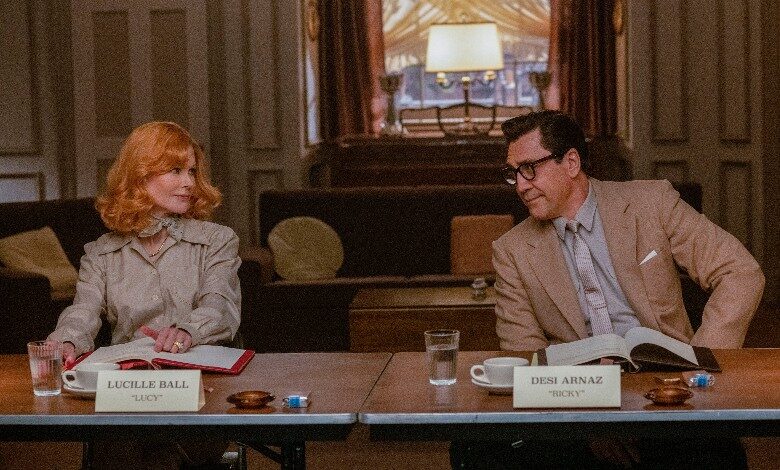
“Oh, Luuuuuucy, did you invite Sen. McCarthy over for dinner?”
Tackling “I Love Lucy” – both the classic TV show and its place in pop culture lore – gave Aaron Sorkin plenty of potential material. The writer/director chose a single week in the life of the sitcom, one that found Lucille Ball’s career in peril.
“Being the Ricardos” examines how Ball, her industrious beau Desi Arnaz and the minds behind “Lucy,” ran head first into the Blacklist.
Yes, it’s Hollywood’s favorite narrative, and it gives “Ricardos” its sense of danger. What’s equally clear is that other elements, from orchestrating a dinner scene sequence to a power couple in distress, offer less dramatic heft.
And, of course, the film stops to deliver messages about the sexism baked into 1950s America. Who saw that coming?
Nicole Kidman is Lucille Ball, a contract player who became America’s sitcom sweetheart. We’re told, via a fabulous framing device, that 60 million people tuned in to see Lucy and Desi, numbers no longer possible in our splintered media landscape.
Why did people connect with “I Love Lucy?” What did it say about the culture at the time? “Ricardos” is too focused on the day-to-day elements of the show to broach that angle. Perhaps an accompanying documentary could flesh out those details.
We’re left with Lucille trying to make the show better, and funnier, while her husband (Javier Bardem, not even attempting to look or sound like Desi Arnaz) spending an increasing amount of time out of her sight.
Is he a victim of Cuban toxic masculinity? Sorkin’s screenplay suggests as much.
Later in the film we see the couple’s child for the first time, and it’s clear a few more moments of the trio together would flesh out their relationship.
The film’s bigger problem is their marriage appears as hollow as a Hollywood sound stage. These are larger than life figures, of course, but the film can’t strip that away to show the hurt, and collaboration, that make a marriage special.
That doesn’t mean “Ricardos” is dull. The reconstruction of classic “Lucy” moments will delight longtime fans, and J.K. Simmons steals every second he’s on screen as William Frawley. The character, older and less appealing than his much younger screen wife (Nina Arianda as Vivian Vance), appears drunk in every other scene.
Don’t be surprised if Simmons enters the Best Supporting Actor race … again.
New Sorkin film explores the lives of “I Love Lucy” icons Lucille Ball and Desi Arnaz.
We talked to Aaron Sorkin about “Being The Ricardos”: https://t.co/Hl2xyKis60 pic.twitter.com/mJais2Py0f
— 11th Hour (@11thHour) December 9, 2021
The aforementioned blacklist threat arrives early, and yet the film doesn’t seem terribly interested in it until the third act, when the meandering story demands a grand finale.
We know Sorkin isn’t a stickler for the truth given his creative spin on “The Social Network.” It’s hard to say how much of “Being the Ricardos” happened the way we see it here. He’s always good for whip smart dialogue, though, and he doesn’t disappoint on that front. These are showbiz types at their creative peak, so the snappy banter makes perfect sense.
Other elements are fascinating but thinly explored. At the time, Lucy and Desi slept in separate beds on the show, and “I Love Lucy” couldn’t show a pregnant female character.
Sorkin’s script leans into those anachronism but often through a 21st century lens.
“Arrested Development” alum Alia Shawkat is the biggest offender here, playing a screenwriter who continually pushes for a more progressive take on comedy. She’s gently lectured by Lucille, but once more it’s envisioned as if the events of the show happened last week, not more than a century ago.
The current woke bylaws won’t have it any other way, and it takes us out of the time period.
When “Ricardos” isnt lecturing us about the era’s sexism, it’s pointing out how Arnaz’s Cuban background proved problematic to the racists around the show’s production. A better screenplay would organically acknowledge these truths.
Here they’re highlighted and spoken in bold type.
View this post on Instagram
One big surprise? Sorkin’s portrait of the era’s press is far from kind. They’re quick to run with rumor, easily manipulated and hardly the truth tellers that movies often suggest.
Somewhere, a certain ex-president is grinning.
Kidman delivers a precise performance that conveys how Ball used her comedic instincts to make everyone around her better, sharper. She was a complicated soul, frustrated by missing out on movie stardom but a perfectionist on set, even when no one needed that level of dedication.
“Being the Ricardos” is smart and uneven, but it’s impossible not to gain new respect for the star who entered so many living rooms in the 1950s, bringing laughs along with her.
HiT or Miss: “Being the Ricardos” is catnip for “I Love Lucy” devotees, but the story’s rich tapestry isn’t explored enough for other viewers.
